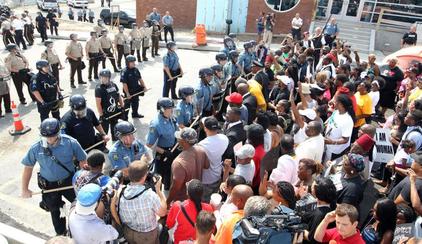|
The crisis continues in Ferguson. People in St. Louis are weary and worried. Beyond the immediate need for security, there is a mountainous road ahead to attain some kind of genuine peace. Long after the streets of Ferguson quiet down (and we pray soon), there a difficult road to true and lasting social harmony. This isn't a Ferguson issue, it's a St. Louis issue. And I would argue, it's a broader issue for an increasingly polarized America. So what do we do in social unrest? How do we begin to address racial tension, segregation, and systemic societal woes? Mr. Rogers (Fred Rogers), the children's TV icon, once wrote about the struggles of his childhood. In his book about Mr. Rogers, I'm Proud of You, Tim Madigan records Roger's own words about how he coped with being a "pudgy, bookish, and extremely shy" boy. After being bullied and taunted, Rogers writes: I started to look behind the things that people did and said: and little by little, concluded that Antoine de Saint-Exupery was right when he wrote The Little Prince: What is essential is invisible to the eyes. So after a lot of sadness, I began a lifelong search for what is essential, what it is about my neighbor that doesn't meet the eye." In the age of digital media and instant Twitter responses (#ferguson, #handsupdontshoot), raw images abound. But are we missing something? There are "essential" things that are "invisible to the eyes." There is an echo of Jesus' Great Commandment to "love your neighbor as yourself" when Rogers says, "what it is about my neighbor that doesn't meet the eye." Loving your neighbor as yourself requires you to search beyond skin and circumstance to find out who your neighbor truly is.
What is it in my neighbor that I can't see? What's behind his words? What's in her background? What has he experienced that I haven't? Discovering what's behind a person - the things not easily visible - takes time and patience. It takes clear communication and a persistent desire to understand the other. Is it obsessively asking the question, "Who are you?" What if the protester and the front-line police officer were experiencing the same thing. Behind the angry yelling, and "hands up," the protester is worried and desperate. And maybe behind the flack jacket and riot mask the officer is too. But words and tweets fly by, as do tear gas canisters and bricks. There is no understanding. As I pray for peace in my city, I wonder how God might want me to be a part of it. My first move is the task of understanding my neighbors, especially those different from me. A compassionate curiosity causes me to wonder, "What is it about my neighbor that doesn't meet the eye?" Comments are closed.
|
JOIN My Tribe
|



